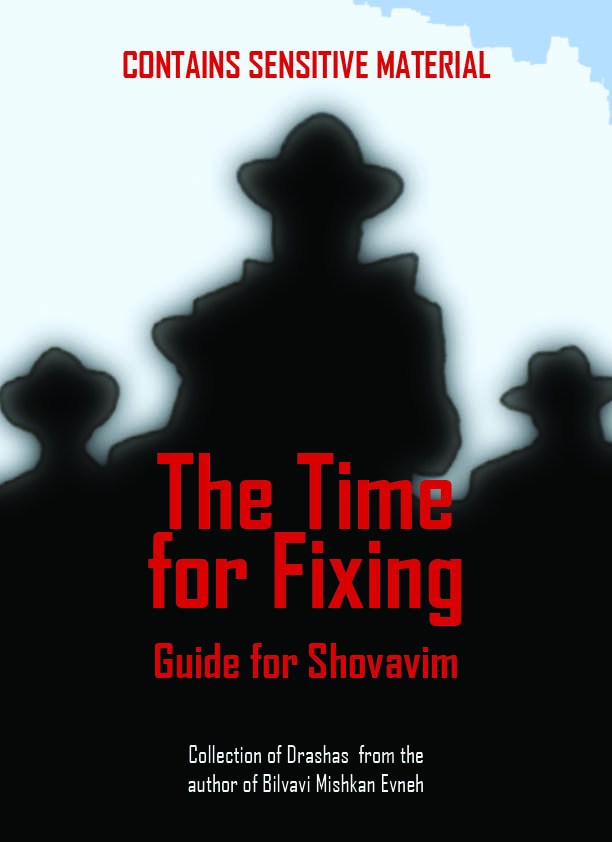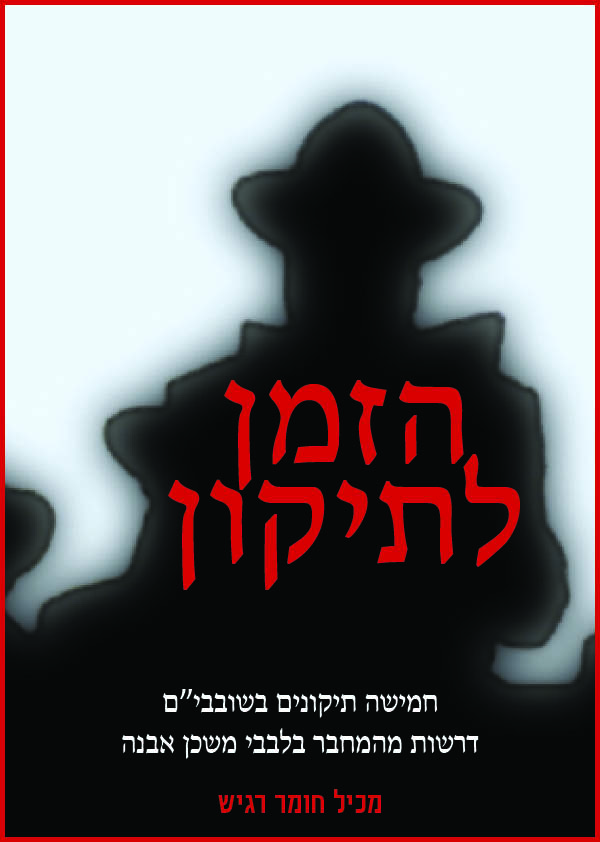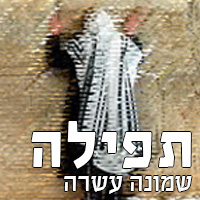- להאזנה דע את מידותיך הדרכה מעשית אש כעס 012 אש דרוח דאש כח התנגות במלחמה
012 Anger | Fighting
- להאזנה דע את מידותיך הדרכה מעשית אש כעס 012 אש דרוח דאש כח התנגות במלחמה
Fixing Your Fire - 012 Anger | Fighting
- 6362 reads
- Printer-friendly version
- שלח דף במייל
Fire-of-Wind-of-Fire: Expressing Opposition Towards Others
With siyata d’shmaya, we are learning about the element of fire and its resulting trait, anger. Now we are up to discussing fire-of-wind-of-fire. As mentioned earlier, this is the force in the soul that motivates people to engage in war - when forces collide with each other and battle each other.
Fire itself is the root of anger, wind-of-anger is when anger is in the form of opposition with others, and fire-of-wind-of-fire is when opposition leads to wars – both the wars fought in the world, as well as war within the soul.
Disapproval of Others In Thought, Word, and Action
In some people, this nature is expressed only in their thoughts, where they feel opposition with others in their thoughts, but they will not take action against others or verbalize these thoughts. With others, this nature extends from their thoughts and into their speech, where they will verbalize their disapproval of others that they are opposed to. And in others, this nature will extend into the realm of action, where a person will engage in active opposition with them; these are the wars which we find in the world.
Mentally Disapproving Of Others
Let us first discuss the first scenario, where this nature is only manifest in one’s thoughts.
When this nature is expressed in thought alone, a person deep down will want to oppose certain things that he encounters. He might think that others are wrong, that certain opinions are wrong, that certain ways of thinking are wrong, and feel disapproval towards the words and actions of others. In either case, the person feels very strongly opinionated.
Sometimes this stems from the holy daas of a person that he may have reached, if he is very connected to the higher dimensions of the soul. This is also called “aisan” (warrior) in the soul[1], where a person strongly holds onto the truths that he believes in and knows, and this is also the meaning of the statement of the Sages, “Torah scholars are as tough as iron.” However, most of the time it is not this holy source which is motivating the person. It is usually coming from a nature in the person to simply be strongly opinionated.
These kinds of people are very strong-minded and they stubbornly hold onto their views, and it is hard to convince them that their thinking may be wrong. They fight “wars” with other people in their minds, by holding very strongly onto their ways of thinking. When this nature becomes very dominant in a person, he will remain unfazed from others no matter how much they try to oppose him, and he will oppose anything\anyone that gets in the way of his thinking.
Verbally Disapproving of Others
Sometimes this nature extends to the person’s speech as well, where a person will express his disapproval of others’ views and actions, via the means of speech. Either he will express his disapproval verbally, or in the written word.
Writers often have the blessing granted from Hashem to express a thought very strongly in their writing, and to express disapproval of others in various areas. There are some writers who will spend their entire schedule writing their disapproval of all kinds of matters, either because they are paid to do so, or simply as a hobby, because it is their very pleasure in life to be able to strongly oppose others, via the means of words - whether verbally or through writing.
Even more so, it is often their very way of talking which invites opposition with others. There are people who love to say things that will bother people, and often it is just the tone of voice that the person is carrying which will offset people. Two people can say the same thing, yet one of them will elicit a stronger reaction from others, because he is conveying a certain tone to his words which is aimed to attack some people.
When you hear such a person talk, you hear all of the personality behind it; you can tell that the words he is speaking are strongly expressing what’s on his heart. This kind of person uses words to attack people. The more sensitive and refined that a person is, the more he will feel like the words and voice of such a person are cutting into him like a knife, and he will find it unbearable. Besides for how speaking strongly with others is a lack of derech eretz[2], it is essentially a way for a person to start up with other people and fight with them, through words.
Many times we can unfortunately see children who are wild and rambunctious, who look like they haven’t been nurtured properly to have even decent manners towards others. Often it is because they grew up in a home where they were spoken to very strongly all the time, and they couldn’t bear it. A person who regularly speaks strongly with others will do so whether he is in the bank, at the supermarket, or at home. He is always speaking in a strong tone with others and starting up with people, expressing his disapproval. In the home, his family members will suffer from his verbally abusive behavior – as Chazal say, “A person cannot live with a snake, under one roof.”
This is the nature of fire-of-wind-of-fire when it is expressed in a person’s speech. It is not only an expression of his thoughts, but a way for the person to exercise strength, which he gains through employing strong language and tone with others.
Some people are not that strong-minded, but they speak strongly with others, because they want to express strength in their words. Usually these are more emotional kinds of people, who express themselves strongly. Most of the time, though, this kind of reactiveness usually leads to anger and other intense negative emotions. In others, though, speaking strongly with others is a result of their strongly formulated opinions, and their thoughts are being expressed through their words.
[Regarding the second kind of person], this can be rooted either in his mind or in his heart: Sometimes it is because they are hold on stubbornly to their thinking, so it is rooted in their mental thinking patterns, and sometimes it is because their hearts have turned into a hardened “heart of stone”, which extends into how they speak.
Actively Opposing Others
A third kind of person we will discuss is a person who opposes others via taking action against them. We can see this nature manifest in the many fights and wars that take place in our world, where people actively engage in opposition with each other, fighting each other in this “realm of action” that we live on. The world is full of these kinds of fights and wars.
There are wars fought for holiness, such as the Ramban’s sefer Milchamos Hashem (“wars of G-d”), and there are also physical wars that are fought in the world, from the beginning of history and until now. Some countries have been at war with each other for centuries, and there are even some countries today that are always at war, taking breaks every so often from their wars and then continuing. They spend their lives in a state of war. They may have a very logical reason of why they are always at war, but the inner reason behind this is because the force of “war” in their souls has been allowed to become extremely dominant.
This nature is very commonly expressed by children, who are able to fight for long periods of time and enjoy it. In the younger years of a person’s life, where a person does not yet have much daas (mature thinking), fire-of-wind-of-fire may be a very common force in his life. There are even adults who don’t stop their childish antics of fighting with people, and they continue to fight with others for long periods of time, even though they are fully grown adults. Their fighting with others might be expressed in their thoughts, words, or in their actions. But during the childhood years especially, fighting might be a very normal and dominant aspect in a person’s life.
If someone has experience with children, he knows that there are some children who get bored if they don’t have some kind of fight, and if they don’t find someone to fight with, they will fight with their teachers, because they live for these fights.
This is the fire-of-wind-of-fire in the soul, which is more dominant in childhood, but it can often continue into adulthood as well, except that in adulthood it is expressed in subtler ways. It never goes away, it stays there deep in a person’s nature, and it merely takes on different forms. The world is full of people who fight with each other, and these people live for the fight; this is all the evil use of fire-of-wind-of-fire in the soul.
Channeling The Force of “War” In The Soul For Holiness
Now let us learn about the inner, holy use of this power.
The truth about out life is that we are always going through wars in our life. The Chovos HaLevovos[3] writes, “Know that your inclination, which is contained in the forces of your soul, which is mixed with your temperament – this is your [evil] inclination, he is the one who hates you the most.” In our life on this world, one is constantly in a state of war with his yetzer hora (evil inclination).
The Mesillas Yesharim writes that all of life is a war with evil, and that we are surrounded by this war wherever we turn. Almost every person without exception must contend with his yetzer hora, and he battles between the warring forces of good and evil within him. For this reason, our entire life is really a war. There is no possibility for anyone on this world who isn’t vulnerable to the yetzer hora; the Gemara says that the only exceptions to this were the three forefathers, whose yetzer hora had become uprooted from them.
There is a force in the soul that is prepared to be at war with opposing forces, and this nature is implanted in us so that we can fight the yetzer hora. However, most people do not use this power of “war” correctly, using it in the wrong places, instead of using it to fight their yetzer hora. In any case, it is impossible for a person to escape this “war” he is in on this world. The reality of our life on this world is that we are surrounded by war on all sides. Our free choice, however, is to choose what kind of “war” we will have in our life (as well as how much we will need to fight, which is another point).
A large amount of people just go through life without ever working to purify their character, so instead of being at war with their yetzer hora, they will find themselves in other kinds of wars and fights, which aren’t holy. They will end up being at war with other areas in their life, because the force of war in their souls will ultimately seek expression, and they will get into trouble at some point.
Such a person will not be able to battle his yetzer hora, because he does not know how to properly engage in war with it; and the wars that he does fight in his life will not lead him towards anything holy. This is the case when a person remains in his impaired state of the soul and he doesn’t seek to grow spiritually.
But if a person seeks to live truthfully, firstly he will identify this nature in the soul that seeks war, and after that, the avodah is to channel it towards it proper and holy direction.
This doesn’t mean that he should weaken his soul’s power of “war” (though there are some times where he may have to do this, if he is very imbalanced in this force of his soul). Instead, the first step to take is to use the power of “war” in the right place – when one realizes that he is really at war, every moment of the day, with his yetzer hora. He will be channeling his need for “war” towards holiness. He will still have to battle evil, but his gain will be that he is using the power of “war” for holiness, and it will greatly lessen the expression of this power where it was used for unsavory purposes.
There is still an avodah upon him to lessen his opposition when it comes to other areas, which we have spoken about in earlier chapters. But with particular regards to the point we are discussing here, the avodah of a person is to live with awareness that he is constantly at war with evil within his soul, and this war never ends. Herein lays the proper and holy use of “war”.
In summary, a person’s avodah in this aspect is to make sure that he is fighting in areas that are worth fighting about (matters of holiness), and to lessen his desire for opposition (which we discussed in previous chapters), and through these two points together, the soul will be guided in a proper direction.
The Deeper Arena Of Your Bechirah
Fire-of-wind-of-fire in the soul, which we are learning about here, is essentially this force of “war” in the soul. As explained earlier, in most people, the force of “war” is expressed in areas where it shouldn’t be, and there is less of an emphasis on one’s personal war between good and evil. But the force of “war” in the soul always seeks expression, whether in the mundane or in the holy.
A person has times where he is awake, and times where he is asleep. While a person is sleeping, is he in a war? It seems simply that sleeping is not a time where we at war. But if a person has become more internal, he realizes that just as there is an avodah while we are awake, which is when we have daas and we have bechirah (free will), so is sleep a time of avodah for us.
We know that dreams tell us certain things about ourselves, because dreams show us what we thought about or imagined during the day, or they are showing us places which aren’t fitting for our soul, which the soul may float to at nighttime, chas v’shalom, when we aren’t careful in protecting it. Our mazal can also see things in our dreams. All of those things are shown to us in dreams. Just as we have bechirah during the day, where we have a war with the yetzer hora, so is there a war with the yetzer hora even as we sleep.
When Shlomo HaMelech slept, he was offered the choice between wealth and wisdom, and he chose wisdom. The simple meaning of this is that even as he slept, he merited spiritual protection from the evil forces of nighttime which may harm the soul. But the truer understanding of this is that his wisdom came from the bechirah he used even as he slept. The depth of our bechirah is present when we sleep!
When we are awake, our intellect is functioning more and it can overpower our fantasies, and it is easier to fight with the yetzer hora then (relatively speaking). But when we are asleep, when our fantasies are more dominant, that is the deeper use of our bechirah to choose between good and evil. This is a bechirah that takes place in our subconscious, and it is there where all of our main choices are found.
The bechirah we access during the daytime when we conscious is therefore not the depth of our bechirah! It is certainly bechirah to some degree, but even animals have some level of bechirah in this regard. The true use of bechirah, which is unique only to humans, is accessed only in the subconscious, while we are asleep.
There are thus two levels to our bechirah – when we are awake and conscious, and when we are asleep and unconscious. For example, if a person dreamt at night that he went to a certain place, it really means that he is choosing in his subconscious to go that place. He has decided to go there – in his dream. It’s not that he happened to dream about this; rather, he decided to think about this in his dream.
Imagine all of the decisions we make in our dreams! Shlomo HaMelech chose wisdom in his dream, but every person as well is choosing in his dreams, to make certain decisions. There is no dream which does not contain decisions that a person chooses to decide.
Chas v’shalom, if a person chose to commit a sin in his dream, it means that he has chosen to do so! That is the deeper reason of why a person has ritual contamination from lewd dreams.[4] It is a reflection of something evil that is rearing its head, deep in his subconscious. It is the yetzer hora, its roots of evil, which hides deep in the heart[5]. During a dream, the hidden recesses of the heart come out of hiding.
The depth of a person’s war with the yetzer hora is therefore not during daytime, but at nighttime when he sleeps. If a person doesn’t fight the yetzer hora during daytime, his nature for war will seek expression in other areas which are not holy, and in addition, he will fall prey to the yetzer hora at nighttime, as the Chovos HaLevovos writes, that a person can become so ‘sleepy’ that his yetzer hora completely dominates him. He almost won’t have any bechirah. When he is awake he is not using his bechirah, so it’s as if he’s already asleep, and now that he’s sleeping, he’s even more asleep, with almost no bechirah to help him fight the yetzer hora. He lives his life in a sleeplike state to begin with, so when he goes to sleep at night, he is truly in a ‘deep sleep’.
When a person is at war with the yetzer hora during the day, the war he fights in his conscious state will penetrate into his subconscious as well, and he will be able to fight the yetzer hora even when he is not conscious. This is the deeper part of oneself, where the main war in a person’s life takes place. His inner parts will merge with his outer parts, and vice versa, and then even when he goes to sleep, he will be able to retain his power of bechirah.
The more a person is in touch with his power of bechirah from daytime, he will slowly acquire the power of bechirah even as he’s asleep, maintaining his awareness even as he’s asleep. This purifies the materialistic aspects of one’s being and it is this area which determines the true level of a person. The time when we sleep is the main battleground where we reveal the true strength of our character.
If a person dreams about some difficulty while he is asleep, what does he wish to do? Does he want to just run away from it, or does he feel like he wants to run away to Hashem? If he summons forth his emunah in Hashem in the dream, it shows where he truly is. If he chooses in his dream to simply run away from the difficulty, that also shows where he truly is….this is the true, deep test of where a person is really found.
In a dream, a person is experiencing his imagination, and the memory of a dream can feel very strong, much stronger than how much a person remembers what he went through in reality during the day. Even when a person forgets a dream when he wakes up, the experience of the dream might be deeply imprinted on his soul. Every soul has gone through many lifetimes, including all the dreams of each lifetime, which add up for a countless amount of experiences of imagination that each person has gone through. All of these imprints make the soul very complicated to know, and that is besides for the general complexities about the soul. Every soul contains many experiences from so many lifetimes that it has been through, and the dreams are a replay of these events; though most people are not aware of this. And the main “war” of a person takes places when he sleeps, where he is subconsciously deciding upon certain things. Only a person who is used to “war” from during the daytime, through having fought his yetzer hora, is one who will be able to battle properly when he dreams in his sleep at night.
The Need For Serenity
However, we must know that “war” is all but one side of the coin in our life. We really cannot live our entire life in a state of “war”. Hashem created six days of the week and a seventh day of Shabbos Kodesh for rest. Our soul as well needs to rest. War is only one part of our life. There is a deeper part of our life where we can draw forth menuchah (serenity).
When this concept is misunderstood, it is translated into lethargy and sleepiness, and this is not menuchah. But in the depths of the soul, one can find the true menuchah.
It is not possible for a person to live a life only in a state of war with his yetzer hora. If he does, his soul will feel like it is constantly amidst a raging storm (even though he is always fighting for the right reasons) that doesn’t stop, and he will become completely dominated by the soul’s fire-of-wind-of-fire. It will be most difficult for a person in this situation to reach any yishuv hadaas (peace of mind) and to find any deep connection [to Hashem], because he will always be in a state of “war”. We can see from even physical wars fought that a person cannot have peace of mind if he is in the midst of war, because the soul cannot be calm in this situation.
In order to live a truthful kind of life, one needs to first go through the toughness of war, and to become a “seasoned warrior” from having fought the yetzer hora. This doesn’t require that he totally defeat his yetzer hora [which is impossible], but to be well-trained in overcoming evil, to a prominent extent. This gives a person a certain degree of menuchas hanefesh, and that is the first step.
And from where does a person draw forth menuchas hanefesh, after having been through the toughness of war with the yetzer hora? It can only come to a person if he is able to connect to a serene point in his life which is “completely good”, where there is no trace of evil. This is the depth contained in the holiness of Shabbos Kodesh, which contains only good and holiness, and no evil [for it is a reflection of the future state, where good will shine completely and all evil will cease to exist].
When a person lives all the time through the external layers of his soul (and in the external aspects of life), there is a war that he faces all the time between the yetzer tov and the yetzer hora; and this war is ongoing, and it surrounds him on all sides, as the Mesillas Yesharim writes. It never ceases, and even when he sleeps, this war continues, and even more so. But amidst all of these wars, a person can at times connect to a point which is completely good and serene. It exists so that a person can refresh himself in order to gain the energy to return to fighting evil afterwards. It is not a search for menuchah merely for the sake of achieving menuchah, but for the sake of having the energy to fight again, refreshed and re-energized.
Where is this place of complete “good” where menuchas hanefesh is drawn from in the depths of the soul? It is the place in the soul of “And as for me, closeness to Hashem is good.” When a person connects to Hashem from deep in his soul, that is where he will find the place that is completely “good”. This gives a person some menuchah even as he’s amidst war, where he can find a place where he is “above” all the wars. But he must then return to war afterwards, just like we return to the weekdays after Shabbos.
Practically speaking, most people are not connected to this deep place of serenity in the soul where all is good. However, a person must be able to access some kind of inner peace in himself, because it is impossible for a person to always be fighting. One must therefore have time every day where he relaxes a little bit.
As an example, Bein HaZemanim is not a time where we are exempt from fighting the war with the yetzer hora, but it is a time where we relax a bit, and the purpose of this relaxation is so that we can become refreshed and regain the energy to fight evil. We can’t stay forever in a state of war. If one truly reaches deeper into his soul, he draws forth menuchah from there not because he has slackened off from fighting, but because he feels a connection to a point that is completely good.
This is the holy way to balance out the fire-of-wind-of-fire in the soul, and in order to completely calm its nature, one needs to draw forth menuchah from deep in the soul. A person who is a “seasoned warrior” from having fought the yetzer hora so much in his life is a person who has reached a certain degree of self-perfection and holiness, and he has reached a great deal of menuchah as a result from this.
In Conclusion
To summarize, we explained how to balance the soul’s force of “war”, the need in the soul that wants to contend with opposition and to do battle.
We explained that the first step is for one to identify the nature to be at “war” and to then channel this desire towards holiness. At that point, though, a person will always be at “war” and he won’t yet be able to find peace from all of this war. And his main war will take place in his sleep, as he dreams, where his subconscious will play itself out. The decisions that he makes in his dreams will reflect his true, current level that he is on right now. The scenes that take place in a person’s dreams are his main area of war with the evil forces of the yetzer hora.
By getting used to this awareness – the fact that one is always at war with evil forces, and by trying to fight - one will eventually become a “seasoned warrior” from all of this. At a certain point he will feel a need to refresh himself and to find some inner peace [which he can find in the holiness of Shabbos Kodesh, which contains menuchah], and if he merits to go deeper into his soul, he will find a great, calming closeness to Hashem in his soul, where true menuchah is found, where all is good.
One needs to constantly move back and forth[6] between these two forces in the soul, between war and inner peace in himself. He needs to fight with the evil within himself, both when he’s awake and when he’s not awake - and he needs to have times as well where he draws forth some calmness and serenity, so that he can become refreshed and then continue fighting the evil.
Herein lays the way to rectify the fire-of-wind-of-fire in the soul.
NOTE: Final english versions are only found in the Rav's printed seforim »















